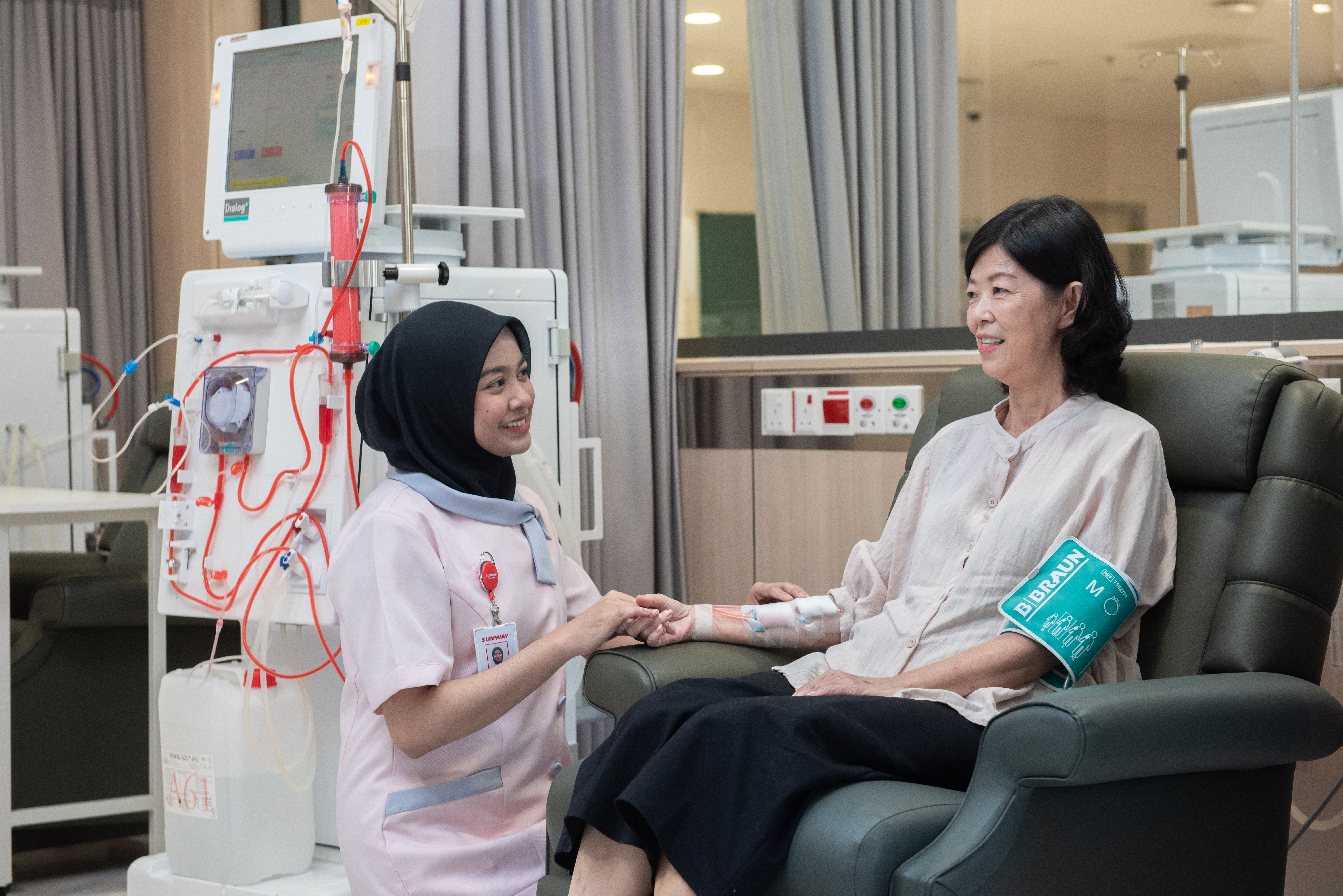11/07/2025
The Invisible Epidemic: Why Chronic Kidney Disease Flies Under our Radar.

Despite being one of the most common non-communicable diseases in Malaysia, Chronic Kidney Disease (CKD) continues to fly under the radar. Often described as a “silent” disease CKD progresses gradually until reaching an advanced stage that requires lifelong dialysis or even transplantation.
Petaling Jaya, 11 July 2025 - In 2018, the prevalence of CKD in Malaysia surged to 15.48%, up from 9.07% in 2011, signaling a worrying trend. Today, over 50,000 Malaysians are receiving dialysis, according to the Ministry of Health, with projections indicating this number could exceed 100,000 by 2040 if early intervention remains lacking. Yet, many remain unaware they’re at risk. CKD’s slow, symptomless nature and lack of public awareness often led to late diagnosis, which occurs only after significant and irreversible kidney damage has set in.
In response, Sunway Medical Centre Damansara (SMCD) is taking a proactive role in closing this awareness gap, championing early detection and public education as critical tools in combating the nation’s growing CKD burden.
Understanding CKD and Its Silent Progression
CKD is a progressive condition in which the kidneys gradually lose their ability to filter waste and excess fluids from the blood. The disease typically shows no obvious symptoms in its early stages – by the time patients experience symptoms like fatigue, bodily swelling, or changes in urination, significant and often irreversible kidney damage has already occurred.
“CKD is a dangerous disease precisely because it hides in plain sight,” explained Dr Chong Yip Boon, Consultant Nephrologist and Physician at SMCD. “When left undetected, CKD can result in life-threatening complications such as cardiovascular disease, symptomatic anemia, metabolic bone diseases, fluid overload and ultimately, irreversible renal failure and death. Its insidious onset and silent progressive nature make early detection both challenging and critical. Lack of public awareness and regular health screening programmes further increase the difficulty in its early diagnosis.”
Why Malaysians Are Missing the Signs
One of the key reasons CKD is frequently diagnosed at advanced stages in Malaysia is the widespread lack of public awareness and regular check-ups around kidney health. Most individuals do not experience any discomfort or clear symptoms in the early stages of the disease. Even when signs like fatigue, changes in urination, or bodily swelling do appear, they are often misattributed to other, less serious conditions.
The common mindset that “feeling fine means being healthy” continues to delay action, especially among high-risk individuals. “The issue isn’t that kidney tests aren’t available. In fact, they are included in most health screening packages,” explained Dr Chong. “The problem is that people simply don’t come in for check-ups until it’s too late.”
According to Dr Chong, screening is especially important for high-risk groups: people living with diabetes, hypertension, heart disease, morbid obesity, kidney stones, gout, or a family history of kidney disease; as well as the elderly, frequent users of painkillers or over-the-counter medications, and those who self-medicate regularly.
“Among these patients, common pitfalls include missing regular appointments, skipping blood or urine tests, self-treatment, and a lack of understanding about their condition,” he added.
In some cases, early signs may be more visible than people realise. For example, abnormal bubbly or foamy urine can be an early indicator of protein loss - a possible sign of kidney damage. If in doubt, a simple urine test with a GP or specialist can determine whether symptoms are benign or related to CKD.
While commonly advised, Dr. Chong places emphasis on practical lifestyle steps to reduce the risk of kidney disease:
- Drink at least 2 litres of water per day (if there are no underlying heart conditions).
- Maintain a healthy, balanced diet.
- Avoid overuse of painkillers, unprescribed supplements, and self-medication.
- Exercise regularly and aim for sustainable weight reduction.
- Avoid or limit smoking and alcohol consumption.
- Schedule routine full-body health screenings and check-ups to have a more well-informed overview of one’s health.
- Manage existing underlying medical conditions such as diabetes, hypertension, high cholesterol, heart disease, and so on.
Shifting the Mindset on Kidney Health
Recognising that early detection is the most effective way to manage CKD, medical experts at SMCD are focused on improving access to risk-informed screening – particularly for individuals with underlying health conditions such as diabetes, hypertension, and obesity.
Rather than waiting for symptoms to appear, SMCD is strengthening efforts to identify high-risk individuals sooner through broader education, increased clinical vigilance, and more strategic approaches to screening within clinical settings. Beyond diagnostics, the hospital advocates for breaking down misconceptions around kidney testing and encourages more Malaysians – especially those in high-risk groups – to take proactive steps in managing their kidney health.
“Malaysians must begin to see kidney health as an essential part of general wellbeing, not something to think about only when symptoms appear,” said Dr Chong. “Routine screening, especially among at-risk individuals, can lead to early detection, delay disease progression, improve quality of life, and significantly reduce long-term healthcare costs.”
Taking Kidney Health Seriously – Before It’s Too Late
Ultimately, SMCD hopes to shift the national mindset – helping more Malaysians understand that kidney health belongs in routine care, not reactive treatment. Recognising the signs too late can lead to irreversible outcomes, but catching the disease early can significantly improve quality of life and slow its progression.
Early detection makes all the difference. SMCD encourages all Malaysians to stay on top of their regular medical appointments and follow recommended health screenings as advised by their clinicians.
To book a screening or learn more about CKD detection, visit Sunway Medical Centre Damansara’s website.



